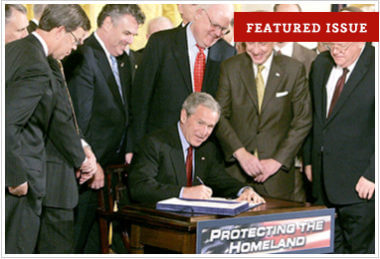Featured in Issues & Controversies in American History:
USA Patriot Act: Defense Against Terrorism or Restriction of Liberties?
 On September 11, 2001, the United States suffered a devastating series of attacks when terrorists crashed three airplanes into the World Trade Center in New York City and the Pentagon building outside Washington, D.C. The attacks killed almost 3,000 Americans and spurred Congress to pass the USA Patriot Act, a landmark law that expanded the government’s power to fight terrorism. Supporters of the Patriot Act argued that, by increasing federal authority, the government was better able to protect Americans and ensure national security. Even if the law infringed on some civil liberties, they contended, this was a small price to pay to prevent deadly terrorist attacks. Opponents of the Patriot Act, however, argued that many of its provisions violated the U.S. Constitution, particularly the First Amendment, which guarantees free speech, and the Fourth Amendment, which guarantees against unwarranted search and seizure. By increasing federal authority, they contended, the law gave the government excessive power and threatened Americans’ civil liberties.
On September 11, 2001, the United States suffered a devastating series of attacks when terrorists crashed three airplanes into the World Trade Center in New York City and the Pentagon building outside Washington, D.C. The attacks killed almost 3,000 Americans and spurred Congress to pass the USA Patriot Act, a landmark law that expanded the government’s power to fight terrorism. Supporters of the Patriot Act argued that, by increasing federal authority, the government was better able to protect Americans and ensure national security. Even if the law infringed on some civil liberties, they contended, this was a small price to pay to prevent deadly terrorist attacks. Opponents of the Patriot Act, however, argued that many of its provisions violated the U.S. Constitution, particularly the First Amendment, which guarantees free speech, and the Fourth Amendment, which guarantees against unwarranted search and seizure. By increasing federal authority, they contended, the law gave the government excessive power and threatened Americans’ civil liberties.
Let your students get the facts and decide for themselves: Does the USA Patriot Act protect Americans against terrorism or restrict civil liberties? Be sure to check out Issues & Controversies in American History’s clear and unbiased examination of the USA Patriot Act this month.
Click on the links below for more information about Issues & Controversies in American History:

